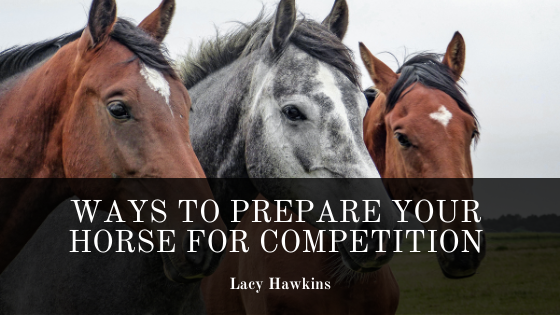Ranked among the top 10 most intelligent animals, horses may not be as obedient and affectionate as dogs, but they do show their affection and willingness to comply with the demands of their owners or riders. Although they can be submissive and eager to please their owners, horses are still herded animals. Consequently, they do not exhibit more independent thinking than other intelligent animals; instead, they react instinctively with flight. So, because of their inherent natures, horses being prepared for competition require skillful training.
Nutrition and Exercise
Before a professional trainer assumes the work of preparing a horse for a show, owners can begin the process of conditioning by making sure that their horses receive the nutrition they need to be fit. Trainers will suggest feeds and supplements that can keep the horse in good shape. Low-starch alfalfa-based feed is nourishing without adding sugar-rich products that cause highs and lows. While alfalfa/grass mix hay will meet the horse’s energy needs, using slow feeders to keep horses constantly grazing as they naturally would also is a positive measure. Supplements for digestion, internal health, and joints are also important. Along with a healthy diet, horses need to lead a natural life in which they have opportunities to run, trot and frolic happily.
Understanding the Horse
Although horses share characteristics attached to their breeds, they still have individuality. Trainers must gain an understanding of the horse’s personality in order to develop a training plan. If, for example, the horse is high-strung, the trainer will develop training that begins with gaining the horse’s confidence in him/her. Only then can the horse and rider be successful in competition.
Knowing How to Lead the Horse to Success
Successful trainers never try to force a horse to do something; instead, they are firm but fair and forgiving. Gaining the trust of the horse to be trained is essential. Once the horse feels that the trainer will keep him safe, training will easily take place. Trainers should also be capable of figuring out what the horse needs from them and how to communicate best with the animal. Trainers should also determine what the horse is capable of doing and what is the root cause of any resistance.
Physical needs must not be ignored, either. If the horse is uncomfortable or sore, he/she will not perform well. It is a mistake to force a horse who is in pain to perform, for it can develop major health issues, in addition, to cause the horse to become “sour.” Horses need regular dental care, hoof care, veterinary exams–sometimes even chiropractic appointments.
